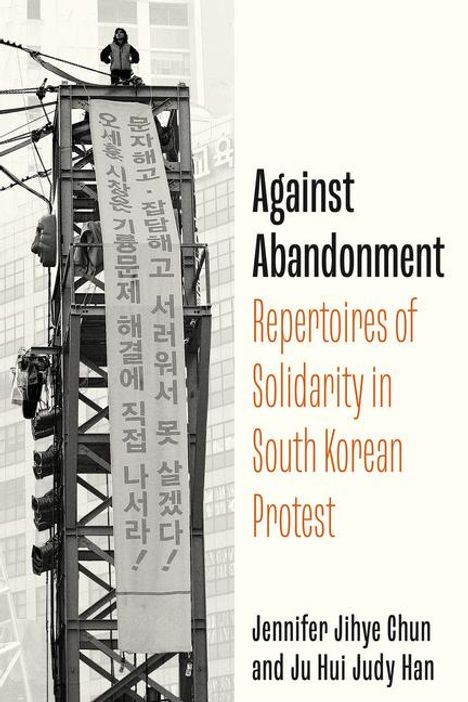Jennifer Jihye Chun: Against Abandonment, Kartoniert / Broschiert
Against Abandonment
- Repertoires of Solidarity in South Korean Protest
(soweit verfügbar beim Lieferanten)
- Verlag:
- Stanford University Press, 06/2025
- Einband:
- Kartoniert / Broschiert
- Sprache:
- Englisch
- ISBN-13:
- 9781503642256
- Artikelnummer:
- 12075126
- Umfang:
- 322 Seiten
- Gewicht:
- 454 g
- Maße:
- 226 x 150 mm
- Stärke:
- 18 mm
- Erscheinungstermin:
- 24.6.2025
- Hinweis
-
Achtung: Artikel ist nicht in deutscher Sprache!
Weitere Ausgaben von Against Abandonment |
Preis |
|---|---|
| Buch, Gebunden, Englisch | EUR 164,81* |
Klappentext
"Across the world, protest has become a much-debated tactic in struggles against extreme inequality, political corruption, and ecological disaster. In South Korea, protest is a ubiquitous and essential form of political expression. In 1987, mass protests forced reforms that led to the present-day government of South Korea. In 2017, the Candlelight movement forced the removal of then-president Park Geun-hye. Beyond these spectacular national protests, aggrieved Korean workers and minority groups regularly turn to protest to assert their rights. Based on long-term ethnographic research with labor and social movement activists, Against Abandonment is at once a chronicle of the life-and-death character of protesting precarity in South Korea and a searing examination of repertoires of solidarity for upending injustice. Protest forms such as long-term encampments, life-threatening hunger strikes, and perilous high-altitude occupations are agonizing to perform and to witness but often powerful as catalysts for change. Chun and Han situate South Korean protest in transnational context to demonstrate how the struggles of South Korean workers are inextricably tied to the globalized conditions of neoliberal capitalism. Building on the work of abolitionist feminist thinkers, the book theorizes protest as a political form with far-reaching resonance across history and geography, and underscores the significance of collective survival, self-determination, and emancipatory transformation"--

